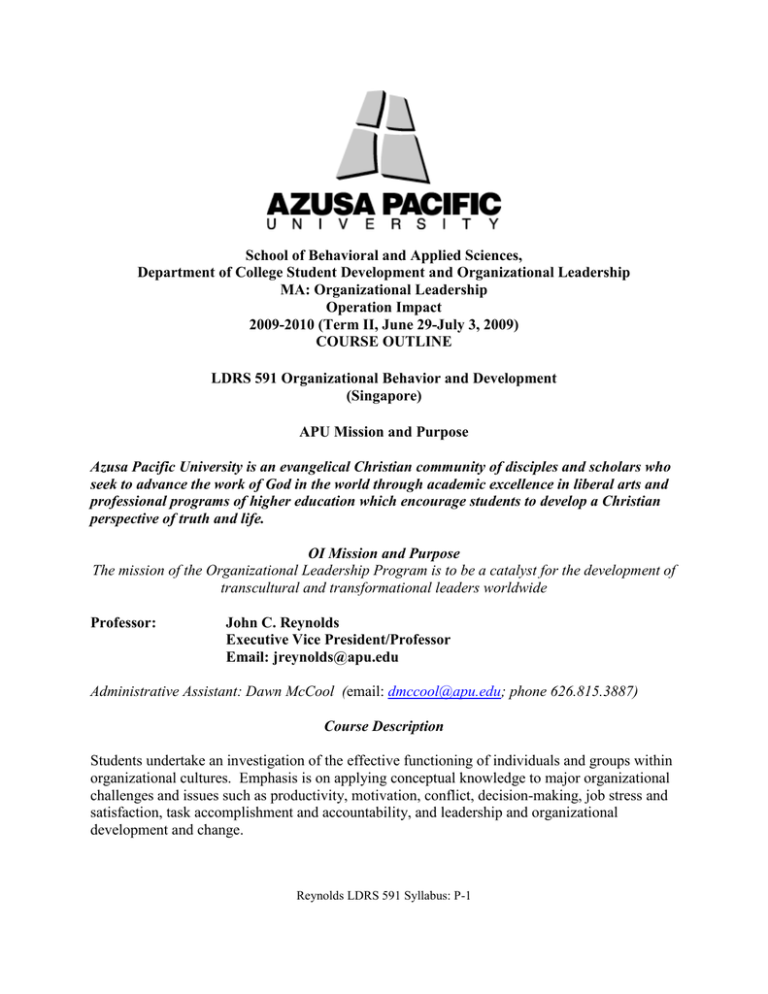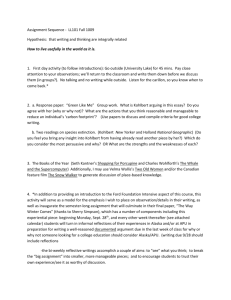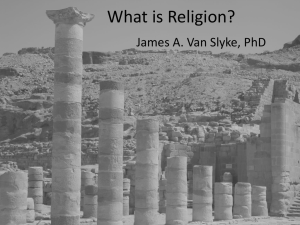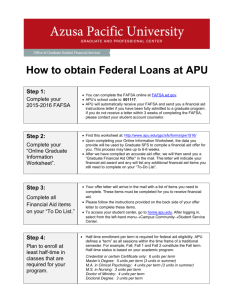Posted syllabus July 2009 - apu.edu
advertisement

School of Behavioral and Applied Sciences, Department of College Student Development and Organizational Leadership MA: Organizational Leadership Operation Impact 2009-2010 (Term II, June 29-July 3, 2009) COURSE OUTLINE LDRS 591 Organizational Behavior and Development (Singapore) APU Mission and Purpose Azusa Pacific University is an evangelical Christian community of disciples and scholars who seek to advance the work of God in the world through academic excellence in liberal arts and professional programs of higher education which encourage students to develop a Christian perspective of truth and life. OI Mission and Purpose The mission of the Organizational Leadership Program is to be a catalyst for the development of transcultural and transformational leaders worldwide Professor: John C. Reynolds Executive Vice President/Professor Email: jreynolds@apu.edu Administrative Assistant: Dawn McCool (email: dmccool@apu.edu; phone 626.815.3887) Course Description Students undertake an investigation of the effective functioning of individuals and groups within organizational cultures. Emphasis is on applying conceptual knowledge to major organizational challenges and issues such as productivity, motivation, conflict, decision-making, job stress and satisfaction, task accomplishment and accountability, and leadership and organizational development and change. Reynolds LDRS 591 Syllabus: P-1 Course Outcomes/Expected Competencies Students will have the opportunity to: 1. Explain the basic approaches to organizational development in order to, assess the quality of the work environment, define factors, impacting productivity, and evaluate the effective utilization of human resources/organizational resources; 2. Understand and analyze the basic core cultures of organizations from a participant observer perspective and to research in depth one aspect of that organizational culture; 3. Understand the structural and behavioral aspects of organizations and how they impact each other. Student Responsibility for Learning The student is responsible for meeting each course objective and outcome. Students’ performance on these objectives and outcomes will be used as a part of the basis for the course grade. As adult learners, students are free to propose alternative assignments to the professor during the course-week where the alternative would be more meaningful and useful in the student's professional tasks. As the professor for this course I am committed to: Treating each student as an individual who is committed to genuine learning Being prepared and ready to share knowledge and information appropriate to the course content Facilitating learning in different forms of delivery to maintain interest and energy for both professor and student Listening to feedback and, where appropriate, adjusting to new ideas Being available for scheduled Skype, email, or telephone interviews From the student I expect: A commitment to deep learning A desire to make this not just a course, but a step in a lifelong learning journey (a journal during this course might be a useful resource) A commitment to show through class participation, learning teams, and assignments your learning in this subject area The students best effort in completing the assessment of learning process Reynolds LDRS 591 Syllabus: P-2 Textbook(s), Resources and/or Required Readings Required (minimum 1500 pages) Adler, N.J. & Gundersen, A. (2007). International Dimensions of Organizational Behavior. Tomson South-Western. (298). Bolman, L.G. & Deal, T.E. (2008). Reframing organizations: Artistry, choice and leadership, 4th edition. San Francisco, CA. Jossey-Bass (438) Additional reading selections from “Recommended Resource List” (equivalent to 764 pages) Recommended Resource List for additional reading ________ (1998). Harvard business review on change. Cambridge, MA: Harvard University Press. Barna, G. (1997). Leaders on Leadership. Ventura, CA: Regal Books. Brown, J. S. (2002). Research that reinvents the corporation. Harvard Business Review. Aug , 105– 114. Collins, J.C. & Porras, J.L. (1996). Building your company’s vision. Harvard Business Review. Sep-Oct, 65-77. Chan, K.W. & Mauborgne, R. (1998). Tipping point leadership. Harvard Business Review, Apr, 60-69. Ferris, W.P. (2002). Theater tools for team building. Harvard Business Review, Dec, 24-25. Graham, Ginger L. (2002) If you want honesty, break some rules. Harvard Business Review, April, 42-47. Hackman, M.Z. & Johnson, C.E. (2004). Leadership: A Communication Perspective. Long Grove, IL: Waveland Press. Hirschhorn, L. (2002). Campaigning for change. Harvard Business Review. Jul , 98-104. Huy, Q.N. (2001). In praise of middle managers. .Harvard Business Review. Sep, 72-77. Meyerson, D.E. (2001). Radical change, the quiet way. Harvard Business Review, October, 92-100. Robbins, S.P. (2001). Organizational Behavior, 9th ed. New Jersey, N.Y.:Prenctice Hall Reynolds LDRS 591 Syllabus: P-3 Strebel, P. (1996). Why do Employees resist change? Harvard Business Review, May-June, 8692. Schaffer, R.H. & Thompson, H.A. (1992). Successful change programmes begin with results. Harvard Business Review. Jan-Feb, 80-89. Class Process The instructor reserves the right to change class outlines or assignments in order to be flexible to the needs of the students and to maximize the learning experience. Organizational Behavior and Global Leadership (Participant Handout) July 2009 Session 1 Welcomes Introductions Administration Syllabus Review Symbolic Frame (A) Ref: Bolman Ch. 3-5 Session 2 Introduction to Org. Behavior OD Model Reframing Symbolic Frames (B) Wednesday Human Relations Frame (A) Ref: Bolman Ch. 6-8 Thursday Friday Monday Tuesday Break Session 3 Structural Frame (A) Session 4 Culture and Management Ref: Adler Ch. 1 Impact of Culture on Organizations (A) Ref: Adler Ch: 2 Impact of Culture on Organizations (B) Human Relations Frame (B) Managing multicultural teams (A) Ref: Adler Ch. 5 Managing multicultural teams (B) Political Frame (A) Ref: Bolman Ch. 9-11 Political Frame (B) Multinational Decision Making (A) Ref: Adler Ch. 8 Multinational Decision Making (B) Creating Cultural Synergy Ref: Adler Ch. 4 Organizational Effectiveness through reframing Leading Globally Ref: Adler Ch 6. Wrap up and Assignments Reynolds LDRS 591 Syllabus: P-4 Assignments 1 Personal Course Management Plan: Prepare a pre-work proposal to include: 1. A list of all of the books/articles (with page counts) you will read to make up the requirement for reading; 2. A due date for the essays and literature review below; 3. A one page summary of your change project describing the project, how you are going to implement the project, your time line and expectations. Due: Second Friday after class 2 Response Essay on the Bolman and Deal text: After reading the text propose a detailed reframing of your organization in a 4-5 page paper citing where appropriate. Describe your organization according to the four frames in Table 15.1 (P 314-315) and nine elements. Include in your response how, as a leader, you would make use of all four frames, both integrated and individually. Due________ 10pts 10 pts 3. Reflection Essay on the Adler & Gundersen text Write a reflection paper of 4-5 pages summarizing the author’s premise, your critique the text, and then reflect on how this text has contributed to your understanding of organizational behavior in a multi-cultural setting. Due ________ 10 pts 4. Literature Review Locate, select, and respond to an additional number of books, journal articles and publications relating to Organizational Behavior and Development in your desired cultural perspective. Submit an annotated bibliography and an electronic copy of your reading journal in your desired format from the presented options in class. Due ______ 30 pts 5. Course Synthesizing Project 30 pts Develop a project where you as a leader seek to bring about a form of change within an organizational setting. Define and describe in no less than 10 pages: A. The group or context, and your role within this process; B. The intended change, the reason why change is necessary and why you were asked to lead this change; C. How you intent to develop relationships and the behaviors of the stakeholders in implementing the project D. Your plan, including its steps and timeline to bring about the intended change; E. Your experience implementing your plan and the impact it generated within you personally and within the organization. (scoring rubrics discussed on final day) Due_______ Reynolds LDRS 591 Syllabus: P-5 5. Write a 2-3 page personal reflection paper sharing your understanding of organizational behavior when you started the course, how this understanding changed through the process of learning in the class or through the assignments, and how you will lead/manage differently in your context in the future based on this learning. Use quotes from your readings, or any material provided for this course. Due: Last day of the semester course 10 pts Grading Rubrics A= 95-100: Exceptional quality. Instructor’s expectations for the assignment have been exceeded. Careful, accurate analysis and keen insight characterize the work. Comprehensive knowledge of relevant disciplines and mastery of course content is reflected through original interpretations. Oral and/or written expression of work is professional in quality and indicates creative thought. A minus= 91-94: Excellent quality. Instructor’s expectations for the assignment have been met. Oral and/or written expression of the work meets standards normally associated with graduate school. B plus= 87-90: Superior quality, although some aspect of the assignment falls short of expectations. Oral and/or written expression of the work meets standards normally associated with graduate school. B= 84-86: Acceptable quality, although more than one aspect of the assignment falls short of expectations. Oral and/or written expression of the work meets standards normally associated with graduate school. B minus= 80-83: Acceptable quality, although more than one aspect of the assignment falls short of expectations. Oral and/or written expression of the work meets minimal expectations associated with graduate school, but the quality of the composition or presentation detracts from the content. C= 70-79: Inferior quality, barely meeting minimal expectations for graduate credit. Oral and/or written expression of the work does not meet standards normally associated with graduate school. (Note that two courses with a grade below the level of B (3.0) will result in academic probation. F: Incomplete and/or unsatisfactory work. All written assignments must be word-processed, in APA (5th Ed.) format and submitted to be received by 11:55pm GMT of the date due. Please use the delivery option of your email system to verify that it has been delivered. There can be NO exceptions. The professor is NOT authorized to grant extensions. Extensions must be processed through the Operation Impact office. Course Policies Attendance, Preparation, and Participation: This is an intensive-type course in that all of the class session activities are compressed into the first 20 hours of meetings and the remainder of the Reynolds LDRS 591 Syllabus: P-6 learning experience takes place across the following 15-week term through eCompanion. All assignments must be submitted to the professor on or before the assigned due-dates. Requests for extensions because of external or health limitations may be presented in writing to the O.I. office, and will be forwarded to the Dean’s office for approval. Advance Assistance: Students wishing feedback (comments, no grade) from the instructor regarding initial drafts of papers/presentations are invited to schedule such with the instructor sufficiently in advance of due dates to enable review, discussion, and subsequent refinement (as necessary). Assignment Options: Students interested in proposing other means (different than those outlined above) for demonstrating their comprehension, inquiry, and skill relative to the purpose(s) of this course may do so. Such students are to submit thorough and well-reasoned proposals (appropriate to graduate-caliber study) by July 2nd providing sufficient interactive time for both the instructor to review and accept or modify the proposal and the student to receive approval before the completion of the intensive session. The following statements appear in the Azusa Pacific University Graduate Catalog: "The maintenance of academic integrity and quality education is the responsibility of each student at Azusa Pacific University. Cheating or plagiarism in connection with an academic program is an offense for which a student will be expelled, suspended, or disciplined. Academic dishonesty is a serious offense, which diminishes the quality of scholarship and defrauds those who depend upon the integrity of the educational system. Academic Dishonesty and Cheating: Intentionally using or attempting to use unauthorized materials, information, or study aids in any academic exercise.” Students completing any examination should assume that external assistance (e.g., books, notes, calculators, and conversations with others) is prohibited unless specifically authorized by the instructor. Students may not allow others to conduct research or prepare work for them without advance authorization from the instructor. Substantial portions of the same academic work may not be submitted for credit in more than one course without authorization. Fabrication: Intentional falsification or invention of any information or citation in an academic exercise. Facilitating academic dishonesty: Intentionally or knowingly helping or attempting to help another commit an act of academic dishonesty. Plagiarism: Intentionally or knowingly representing the words, ideas, or work of another as one's own in any academic exercise." The instructor does not allow the use of editors without the prior approval. If editors of any kind are used, they may only serve as proofreaders in order to assist with grammar, syntax, flow of thought, and writing mechanics. Editors must only respond to the student’s writing that is presented, they cannot provide new content on behalf of the Reynolds LDRS 591 Syllabus: P-7 student. Students must retain all drafts of their work before and after proofreading and assistance by an editor in order to indicate the editor’s level of input. Students may not submit work done by another person without proper and full attribution and citations. Incompletes and Late Submissions Incompletes are rare and are available only in “special circumstances” (illness, death of a family member, emergencies, accidents, and natural disasters) upon recommendation of the professor, with the permission of the Chair of the Department of College Student Development and Organizational Leadership and/or the Dean of the School of Behavioral and Applied Sciences. For late submission of assignments a 10% penalty will apply to the final grade. Notification for a late submission or any other changes should be submitted after Last Day to Withdraw from Classes (see Term Dates and Deadlines below). For policies regarding withdrawals and grade record permanence, see Graduate Catalog and Student Handbook. Appeals and grievance procedures are available in the Graduate Catalogue. Withdrawal Policy and Grade Permanence. See Graduate Catalogue for these an all policies relating to academic records). Course Material All material in class including the syllabus, printable files for the power point and other handouts that we will be using during the week, will be available under the course ID at http://home.apu.edu~jreynolds There will be other additional resources and supplemental reading files that may be of interest to some of the class members. Adobe Acrobat Reader and the latest version of MS Office will be needed. Reynolds LDRS 591 Syllabus: P-8 Library Information Guide Azusa Pacific University Online Library Resources for Operation Impact Students Your librarian: Dave Harmeyer, MLS, Ed.D., dharmeyer@apu.edu, AskNow chat hours Wednesdays 3:005:00 p.m. (California time). Introduction: While you’re in your O.I. program consider me as your contact back at Azusa Pacific University (APU) in California for your online library needs. Don’t hesitate to email me if you’re having questions about this guide or starting a topic, finding scholarly resources, citing authors & works properly, creating a bibliography, etc. Chat with a reference librarian 24/7: Go to http://www.apu.edu/library/, scroll to the bottom right and click on . Click “chat online,” fill out the form and you will be connected to a live librarian in the states. These librarians know which databases APU owns and can answer your reference questions anytime of the day or night. Although too early for most, I’ve listed my AskNow hours above just incase. Quick start: Go to www.apu.edu and on the bottom left hand side under “Inside APU” click on Libraries. This takes you to the University Libraries’ main web page. For access to full text scholarly articles: click on All Databases and, for most topics, you’ll find full text information by clicking on “A” and choosing the database Academic Search Premier. Here you’ll be asked you for your APU Net I.D. (username) and Password. If you have any access problems at this point (doesn’t work, can’t remember your password or username, etc.) contact IMT (Information & Media Technology) at Helpdesk@apu.edu and let them know you’re an APU student in South Africa. Finding full text articles: APU has over 110 electronic databases, most with full text articles. Go to www.apu.edu click on Libraries (bottom left under “Inside APU”), then click on All Databases (middle of the page). Databases (A-Z) are of 2 kinds: subject specific (like Grove Art Online or ATLA Religion Database) and general (like Academic Search Premier). Also, the databases are listed by subject areas. Under “Choose databases by Subject or Major” click on the pull-down menu and click on Education and you’ll see 15 databases. I suggest you try the following 3 databases to get you going in the right direction LexisNexis Academic Provides access to a wide range of U.S. and International full text news, business, legal, and reference information including up to the moment newspaper reports and wire services on countyspecific events. The default is “Easy Search” tab and “Major U.S. and World Publications.” Add “News Wire Services.” Then in the 1st box type a country name and type your topic and see what happens (typing “South Africa anthropology” for example retrieves 17 full text newspaper articles, one from South Africa). Reynolds LDRS 591 Syllabus: P-9 The following 2 databases use controlled vocabulary such as subject headings and descriptors to index articles. You will retrieve more relevant results if you use subject headings in your searches instead of key words. Academic Search Premier A multi-disciplinary full text database containing full text for more than 4,500 journals, including more than 3,700 peer-reviewed (scholarly) titles. Try “conflict management” in the first box and “South Africa” in the second box and change the search field for both from “Select a Field (optional)” – which means “key word” -- to “SU Subject Terms.” Retrieved are 33 documents with at least 19 full text. The 10 terms on the left side of the screen represent the top ten subject headings in these 33 records. By clicking on one of these terms, the results will change to include only those records in the 33 that have this subject heading (a nice way to narrow your results). For those records that do not have full text see Periodical Finder below. Results can be limited to Scholarly (Peer Reviewed) Journals) and/or full text articles by checking the boxes so labeled in the search screen. ProQuest Search Another full text collection of journals, magazines and newspapers for information on a broad range of general reference subjects. Try “South Africa” and change the search field from “Citation and document text” to “Location.” And add “anthropology” as “Subject” and retrieved are 117 documents. Click on “Scholarly Journals” and the results now are 74. Periodical Finder: If you don’t find the full text for an article, use this tool to see if it’s in another one of APU’s databases. If available, click on the Periodical Finder link or icon in the article record and up will come the journal’s record with holdings information. Or bring up another browser, go to www.apu.edu/library/ and click on Periodical Finder. Type in the title of your journal and look at the holdings information to see if your article is covered. Click on the database link and drill down to the full text of your article. Finding Electronic Books (Ebooks): APU owns 8,100 Ebooks. On the University Libraries’ main page (http://www.apu.edu/library/) click on Library Catalog – APOLIS2. Select “Keywords,” click on the pull down menu under “View Entire Collection” and choose Ebooks. ” As an example, type “South Africa” and 35 Ebooks come up. Click on one of the records and then click on the URL link under the words “Click on the following to:” in order to bring up the Ebook. Click on “View this eBook” and search by: 1) using the table of contents, 2) going to the book’s index, or 3) using books internal search engine for any word in the book. Self-paced tutorials: Go to http://www.apu.edu/library/ and under Research Help (bottom right), click on “Research Guides and Tutorials.” Scroll to the bottom and you will find two types of tutorials: 1) under General Guides instructions on step-by-step research, online searching, etc. and 2) under multimedia tutorials 4-5 minute flash tutorials that include how to find articles on our databases. How to cite in APA: Go to http://www.apu.edu/library/ click on “Research Guides and Tutorials.” Scroll to the bottom under Citation Guides. Or go to http://owl.english.purdue.edu/owl/resource/560/01/ Reynolds LDRS 591 Syllabus: P-10


